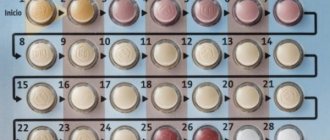Number of views: 53,226
The body of a pregnant woman performs a super task - it works to create a new person, and therefore needs an increased dose of vitamins, microelements, minerals and other useful substances. One of these elements is calcium . It is responsible for the formation of the skeleton , nervous system, and development of the child’s internal organs. Calcium during pregnancy, which enters the mother's body in sufficient quantities, reduces the risk of miscarriage, severe bleeding during childbirth, and increased blood pressure.
How does calcium affect the body of mother and child during breastfeeding?
Calcium D3 Nycomed is intended to normalize the phosphorus-calcium balance in the body. The vitamin-mineral complex is insurance for mom: it allows you to preserve the strength of your skeleton and teeth, silky hair and strong nails for many years. The drug prevents the formation of paraterin, which increases the leaching of calcium from bones and leads to osteoporosis.
Calcium is involved in the regulation of neuronal excitability, hormone synthesis and is an element of the hematopoietic system. Vitamin D3 improves the absorption and redistribution of Ca throughout the body. Without cholecalciferol, no matter how much calcium a woman takes, it will only be absorbed by 30%.
Calcium deficiency manifests itself in the following symptoms:
- brittle nails and rapid tooth decay;
- dryness, thinning hair;
- bone pain;
- night cramps and muscle aches;
- poor skin condition;
- fragility of blood vessels;
- mental instability;
- rapid fatigue.
Ca is also necessary for the child: it not only strengthens bone tissue, but also participates in all vital processes in the baby’s body.
Dr. E. O. Komarovsky believes that it is calcium from mother’s milk that is responsible for early and painless teething, the absence of caries in preschool age, the prevention of rickets and the prevention of seizures in the baby.
There is no need to be afraid to take Calcium D3 Nycomed during breastfeeding. The product contains a prophylactic dose of components, which is used only for the needs of the mother. The baby receives another, already processed calcium from milk. Despite this, if a vitamin and mineral supplement is prescribed, a young mother should inquire about the symptoms of hypercalcemia and hypervitaminosis in young children.
Nutrition for a nursing mother
During pregnancy, most women try to choose healthy foods.
This approach should remain after childbirth, since the baby’s growth accelerates even more. Additional inclusion of calcium-rich foods in the diet will help replenish reserves and maintain the health of the young mother during breastfeeding. This mineral is one of those components whose needs can be calculated in grams. A baby under one year old needs about 600 mg per day. A nursing mother needs 1.6 - 2 g. This amount will ensure not only the full composition of breast milk, but also to avoid leaching of calcium from the bones of a young mother. This will help reduce the risk of osteoporosis, which is common in older women.
Composition and release form, packaging options
The drug Calcium D3 Nycomed is produced by the Norwegian company Nycomed PharmaAS. They are white chewable tablets convex on both sides with an orange, mint or strawberry-watermelon taste and smell. Packaged in plastic bottles of 30, 50, 60, 90, 100 and 120 pieces; The lid is equipped with a membrane that monitors the integrity of the package.
Table 1 - Composition of Calcium-d₃ Nycomed
| Active substance | Contents in 1 tablet |
| Calcium carbonate | 1250 mg |
| - equivalent to pure Ca | 500 mg |
| Vitamin D₃ | 200 IU (5 mcg) |
| — as a concentrate in inactive form | 2 mg |
| Sorbitol | 390 mg |
| Aspartame (sugar substitute) | 1 mg |
| Povidone | 36.4 mg |
| Magnesium stearate | 6 mg |
| Isomalt | 62 mg |
| Stabilizing agents | 0.0008 mg |
| Orange oil | 0.97 mg |
| Mint flavor | 31.9 mg |
Sources of calcium
Among your daily meals, you can choose foods that will help effectively increase your calcium intake during lactation. When deciding whether to include a new product in the menu, do not forget about the risk of allergies in infants. When feeding, each product should be introduced little by little and with caution.
There are foods that are particularly high in the mineral.
- Sesame seed. Record holder for calcium content. 100 g of product contains up to one and a half grams of mineral. Sesame seeds contain valuable vegetable oil, which further enriches the diet with polyunsaturated fatty acids. Of course, it’s not worth eating it in such quantities. But including sesame in the menu more often will become a useful habit.
- Greens and vegetables. A variety of greens will be a good addition to your meal. Parsley contains an average of 245 mg of calcium per 100 grams, 210 mg in leafy greens and 106 in spinach. All types of cabbage are good sources.
- Soy products. If you are intolerant to cow's milk proteins, soy products will help fill your needs. But when consuming them, there is also a high risk of an allergic reaction.
- Canned fish. Not the most useful product. However, the high cooking temperature allows the fish bones, a rich source of calcium, to cook. Can a nursing mother eat canned food? With limited salt consumption with other foods, it is sometimes possible to include fish in the menu in the absence of allergies.
Dairy products as a source of microelements
Dairy products are a common source of calcium. It should form the basis of nutrition for nursing mothers due to the large amount of nutrients it contains. Fermented milk products help improve digestion, because... they contain lactic acid bacteria. In addition, lactic acid improves the absorption of calcium in the intestines.
The following dairy products will help compensate for the lack of microelements:
- Natural cow's milk. Although the product is rich in Ca, it should be consumed in small quantities. According to the recommendations of modern pediatrics, in the first 3 months of a baby’s life it is better to abandon it altogether. Milk contains a large amount of protein, to which a child may develop an allergic reaction or dyspepsia.
- Cottage cheese or homemade yogurt. The presence of calcium in these products is high, and they do not pose any danger to the health of the baby.
- Cheese. Women during the lactation period are recommended to include hard cheeses in their diet, because... in soft species the amount of calcium is insufficient. It is forbidden to consume processed cheeses, because... they often contain chemicals that cause an allergic reaction or even poisoning.
Homemade yogurt is an excellent source of calcium
Top 5 Calcium-Containing Foods for Nursing
When breastfeeding, a large amount of microelements, including calcium, is washed out with milk, so young mothers should eat more foods high in calcium.
Below are the top 5 foods by calcium content per 100 g serving:
- Sesame – 1150 mg. It is recommended to add it to flour products or salads, or you can eat it just like that.
- Almonds – 254 mg. Any nuts are not easily absorbed by the body, but their moderate consumption will be of great benefit to a nursing mother. 2 times a week, 30-50 grams will be enough to strengthen hair and nails.
- Fresh herbs, especially parsley – 245 mg. Including greens in your daily diet will help cope with calcium deficiency in the body. It is recommended for nursing mothers to eat spinach, parsley, broccoli, and dill.
- Dried apricots – 170 mg. It is a useful product for young mothers. In addition, this is an excellent option for preparing delicious compotes and desserts.
- Dried beans – 150 mg. Legumes are not an easy product for the digestive system, so it is better to use them with caution so as not to provoke gas in a newborn.
We recommend reading: Recovery after childbirth - figure, abdomen, chest, hair
Indications for use during lactation
Calcium D3 Nycomed is a drug for the prevention of vitamin deficiency during breastfeeding. The drug has a beneficial effect on the woman’s body, allows it to eliminate calcium deficiency in a short time and eliminate the consequences of pregnancy. Taking tablets by chewing increases the concentration of the element in the oral cavity, strengthens the enamel and prevents the development of caries. This form of the supplement is more physiological and reduces the risk of adverse reactions in mother and child.
A vitamin-mineral complex after childbirth is prescribed in the following cases:
- Lower back pain and leg cramps.
- Caries.
- Hair loss.
- Frequent occurrence of hematomas.
- Numbness of the limbs.
- Chronic fatigue.
- Irritability.
A sufficient amount of Ca in the body has a beneficial effect on the state of the nervous system, the course of physiological processes and the mechanism of blood clotting.
The body's cry for help
If you have a calcium deficiency, you will understand this by the signals that your weakened body will give you. These symptoms are common to all women, regardless of whether she is breastfeeding or not:
- brittle nails and hair;
- hair loss;
- crumbling of teeth;
- dry skin, possibly even premature aging;
- the appearance of acne on the skin;
- joint pain;
- increased fatigue;
- poor concentration;
- cramps and muscle pain;
- bleeding gums;
- the appearance of caries.
The condition, of course, is unpleasant, but easily fixable. For girls with these symptoms, a detrimental effect on their appearance, which is difficult to miss, can be a huge disaster. And for women who have become mothers, the main reason for urgent measures to solve the problem will be the consequences of calcium deficiency for their baby.
Contraindications and possible harm
Calcium D3 Nycomed has a number of limitations in use. The supplement is prescribed with caution to women with autoimmune diseases due to the risk of rapid conversion of colecalciferol to its active form. The medication is also contraindicated if there is an increased level of calcium in the body (determined by a blood test) or hypervitaminosis D.
Other restrictions on taking the drug during lactation:
- individual intolerance to the components of the drug;
- nephrolithiasis;
- open form of tuberculosis;
- hypercalciuria;
- renal failure;
- hypercalcemia;
- urolithiasis disease;
- phenylketonuria.
Chewable tablets contain excipients to improve the taste of the drug and often cause allergies in a nursing mother. They are also harmful to the child. When sweeteners and flavorings get into milk, they cause diathesis and other undesirable reactions of the child’s body.
In addition to the main active ingredients, the tablets contain isomalt, sorbitol and aspartame, so they are not recommended for use by women with intolerance to fructose, glucose and galactose.
Symptoms of micronutrient deficiency
In addition to the general condition, women show signs of quite dangerous diseases.
Osteoporosis
A deficiency of the element leads to osteoporosis. Characterized by decreased bone density. As a result, their fragility increases due to the leaching of microelements from bone tissue.
Cardiovascular diseases
Getting insufficient amounts of calcium leads to diseases of the cardiovascular system. In this case, the person is not protected from strokes and heart attacks. The level of risk of cardiovascular diseases is determined by the attending physician.
High blood pressure
The substance is also responsible for normalizing blood pressure. People suffering from high blood pressure do not even suspect that the problem is precisely the lack of a microelement. Daily consumption of the acceptable amount solves the problem.
We recommend reading: Hormonal imbalance after childbirth: symptoms and recovery time, treatment of the disorder
Oncology
As a result of the research, scientists came to the conclusion that with a deficiency of the element, the risk of developing intestinal cancer increases.
Instructions for taking the drug for hepatitis B
You should start taking calcium only when indicated and only after visiting a doctor. You can drink it both for prevention purposes and to eliminate an already developed lack of Ca in the body. It is recommended to chew or dissolve the tablets. It is acceptable to simply swallow with water, but in this case the bioavailability of the supplement is noticeably reduced.
Duration and time of admission
During pregnancy and immediately after childbirth, a woman loses a lot of calcium. This is due to hormonal changes in the body and preparation for lactation. After 6 months, the amount of the element is gradually restored, bones become stronger, nails peel less and hair falls out. Therefore, taking the supplement in the first six months of breastfeeding is mandatory. The decision on the need for further use of the vitamin-mineral complex is made by the doctor.
When using Calcium D3 Nycomed for the purpose of prevention and treatment of deficiency, the course duration is 1–1.5 months. The number of repeated appointments and the duration of breaks is determined by the specialist. You can go the other way and take calcium supplements in courses of 7–10 days every month. It is better to take the medicine after meals.
Dosage
During pregnancy and lactation, the daily dose of nutrients increases, so to cover the deficiency, a young mother needs 1500 mg of calcium and 600 IU of vitamin D₃. Considering the amount of the element supplied with food, a woman is not recommended to take more than 1 tablet of the combined product per day. Only a doctor can change the dosage and regimen.
Overdose and its dangers
Despite all the usefulness of Calcium D3 Nycomed, you should not abuse the drug, especially when breastfeeding. An overdose can cause lethargy and drowsiness, depression, memory impairment and attention. Hypercalcemia often causes arrhythmia, high blood pressure, decreased appetite, nausea, headache and other undesirable changes in the body.
Overdose symptoms:
- sudden weight loss;
- thirst;
- muscle weakness;
- defecation disorder;
- abdominal pain;
- mental disorders.
If the dosage is significantly exceeded (more than 2000 mg Ca per day), damage to the urinary system occurs, calcification of soft tissues and organs develops, and the phosphorus-calcium balance in the body is disrupted.
If signs of overdose occur, the young mother should stop consuming calcium and vitamin D and then consult a doctor. To reduce the adverse effects, you need to rinse your stomach or take activated charcoal. The use of diuretics will help speed up the removal of elements from the body.
Side effects and allergies
Taking a vitamin and mineral supplement rarely causes side effects. Unpleasant symptoms are likely only if the drug is used incorrectly and the dosage is exceeded.
From the digestive tract, a nursing mother may experience diarrhea or constipation, stomach pain, dyspepsia, and sometimes flatulence. The development of hypercalciuria, hypercalcemia or Burnett's syndrome (alkalinization of the body) is extremely rare.
Much more often, Calcium D3 Nycomed causes skin reactions in nursing mothers: rash, itching, redness, irritation. On the part of the immune system, in exceptional cases, swelling of the larynx is possible.
Daily intake for hepatitis B
For a nursing mother, it is important not only to consume the beneficial substance, but also to replenish the amount that the baby consumes. The daily dose during lactation is one and a half grams; the mother can eat this portion for breakfast in the form of a glass of milk, preferably low-fat, and several pieces of hard cheese. This norm exceeds the dosage of an ordinary person by 1.5 times. It is important to remember that when preparing the correct diet for a nursing woman, these parameters should not be exceeded. Since an excess of this element often leads to hypercalcemia. It can provoke a number of negative consequences - lead to depression, reduce appetite, cause nausea, malaise, and drowsiness. Therefore, you need to know moderation in everything - limit yourself to excessive consumption of foods rich in calcium.
The daily calcium requirement for breastfeeding is 1.5 g, which the mother can obtain both from food and from appropriate medications.
Reviews, pros and cons of the supplement
Calcium D3 Nycomed tablets are deservedly popular among nursing mothers. Women who took the drug as a course speak very highly of it.
Pros:
- Ease of use;
- rapid onset of effect;
- preventing the development of osteoporosis in the future;
- a prophylactic dose of active substances that makes overdose difficult;
- once a day;
- improvement of appearance.
Minuses:
- contains flavorings and sweeteners;
- may cause allergies;
- should not be taken if you have kidney disease.
Do you have experience taking Calcium D3 Nycomed during breastfeeding? Share your opinion about the drug, leave a review.
Important trace element
This is what we want to call calcium because of its indispensability in the body of mother and baby. The microelement performs many functions that only it can perform perfectly. Calcium has no analogues or substitutes, and its content in the body is 2% of the total body weight. We want to share with you why it is so useful and why you can’t do without it:
- the main and most famous quality of calcium is that it forms the basis of human bone tissue;
- it also forms tooth enamel;
- lowers blood pressure;
- strengthens the walls of blood vessels;
- reduces the level of bad cholesterol in the blood;
- reduces the likelihood of allergic reactions;
- strengthens hair and nails;
- guarantees healthy blood clotting;
- normalizes the functioning of the nervous system, increases resistance to stress;
- relieves fatigue;
- resists the formation of blood clots;
- ensures healthy functioning of the endocrine system;
- guarantees the elasticity of muscle tissue.
So, the role of calcium is not limited to a strong skeleton: it responsibly performs many important functions for all body systems. After childbirth, a woman’s body is weakened and more than ever needs help for a quick recovery. And the increased calcium consumption during breastfeeding clearly does not contribute to this. Therefore, mommy especially needs this resource. Her baby requires it no less: after all, his bones are just forming, and he cannot do without calcium.
10 facts about calcium: video
Where to buy the supplement
Tablets with calcium and vitamin D can be purchased at any hospital pharmacy or ordered online on the Zdravcity website. To do this, follow the link and make a purchase:
Calcium-d3 nycomed tab. chewing 500mg+200me No. 60 (mint)
from 317 ₽
More details
The store offers fast and free delivery of goods to city pharmacies. Payment is made upon receipt of the product. Delivery times in Moscow and St. Petersburg are within 24 hours; delivery to more remote regions takes three days.
Table 2 - Prices for Calcium D3 Nycomed in Moscow pharmacies
| Pharmacy name | Price for 60 pieces, rub. |
| Zhivika | 294 |
| Samson-Pharma | 393 |
| Planet Health | 276 |
| For the thrifty | 290 |
| Capitals | 291 |
| Neopharm | 285 |
| Good Pharmacy | 250 |
Adjusting your diet
The beauty of this microelement is that its required amount can be obtained from a balanced and nutritious diet. You just need to include products from our list in your menu. You don’t have to worry about your baby’s negative reaction to your new diet - it will be useful for the baby too.
- Love natural cottage cheese and yogurt - this is a tasty and healthy food with a high content of essential microelements. If you buy these products in a store, choose the freshest options with the shortest shelf life.
- Among the variety of cheeses, hard varieties are preferred. They not only contain the necessary amount of calcium, but are also more beneficial for mother and baby.
- Sesame seeds contain a huge supply of microelements. However, they are included in the list of strong allergens, so when breastfeeding they require special caution and a sense of proportion.
- Legumes are allowed for breastfeeding women, but in limited portions. Peas, white and red beans will give you a large dose of calcium, but they should only be on the menu when cooked.
- Green apples, grapefruits and bananas, although they can sometimes provoke allergies, are still allowed for mothers who are breastfeeding.
- Among fresh greens, there are types rich in calcium, which, in addition to this wonderful property, are allowed for mothers during lactation. These include dill, spinach and parsley. The ban can only be if the baby has colic.
- Dried figs are also a storehouse of microelements, and they also perfectly satisfy hunger and add a piquant note to dishes.
- We also advise you to pay attention to baked pumpkin - another source of calcium.
To eradicate the problem of deficiency, you need to know the daily requirement. For a nursing mother it is 1.5 grams. This amount can be obtained from a couple of slices of hard cheese and 1.5 cups of milk. Ideally, this is the amount a woman should be guaranteed to receive in the first 6-8 months after childbirth. When breastfeeding is completed, the dosage can be slightly reduced, but taking into account the doctor’s recommendation.










